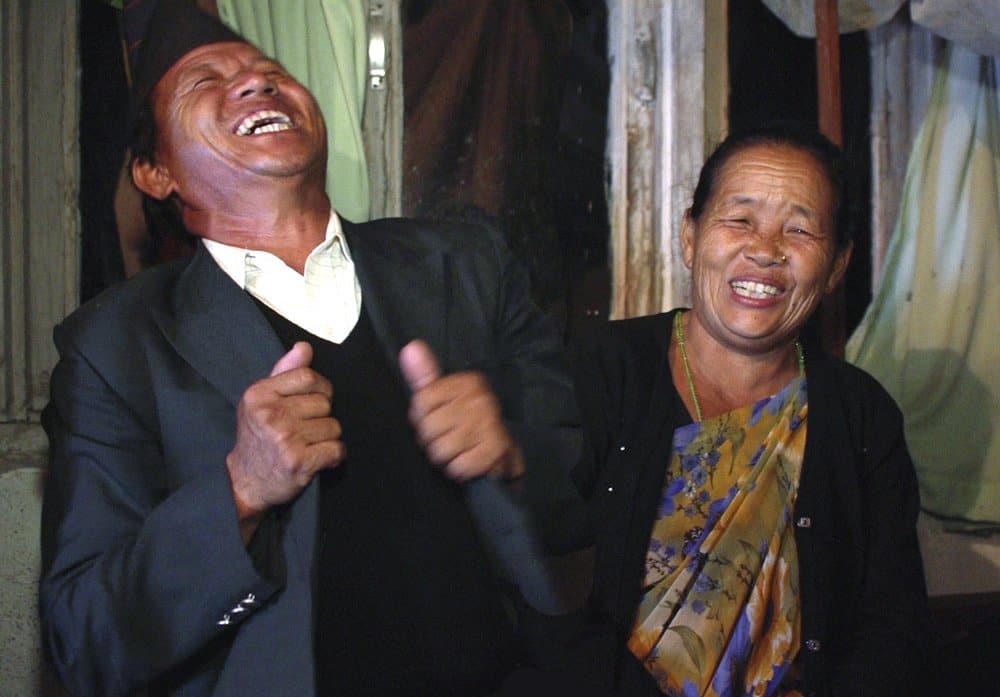Caroline Anderson/IMB
KATHMANDU, Nepal (BP) – In the West, the question, “How did you meet your spouse?” garners a variety of answers. Some husbands and wives meet in high school or college. Some are set up on blind dates or meet through dating websites. Other couples meet through mutual friends.
Bal and Anila Rai met through the sounds of a leaf.
The Rais believe music and instruments are not just a way to meet spouses but are a way people can connect with their Creator. In the past, the Rais translated worship songs for a Christian organization and now are involved in writing worship songs in their native language.
The Rais are incorporating traditional instruments into the songs – a leaf being one of them.
Nepal is a nation rich in musical instruments, and some people groups use leaves as an instrument. The Rais live in eastern Nepal and are from the Lorung Rai people group. Nepal has 120 people groups.
“Playing the leaf was not something our parents taught us,” Bal says.
Rather, leaf whistling is something that someone passed on through giggles and whispers in jungles and rice fields.
When Lorung Rai youths are out collecting firewood or working in the fields, a boy who wants to communicate romantic interest or get a girl’s attention whistles a tune on a leaf. If she’s interested, she’ll play back.
Blowing leaves is like blowing kisses, Bal explains. It’s how he and Anila met and fell in love.
When asked who sent the first leaf whistle, the couple chuckles, and, in an instant, the wrinkles disappear and they’re both teenagers again. Bal is now 55 years old and Anila is 53.
“The rooster crows, and the hen answers,” Bal says impishly, slapping his knee and breaking out into a boyish laugh. Anila playfully swats him for his comment.
Anila is pleased he remembers and that he still gets excited talking about it.
In Nepal couples don’t often talk of “love stories” and how one would meet his future spouse. The culture is conservative, which is one reason for not talking about love, but people don’t often ask. Bal and Anila expressed thanks for being asked how they met.
Times are changing now, but most Nepalese couples in the past met through arranged marriages.
Bal and Anila have what’s known in South Asia as a “love marriage.” Technically, it was first the leaf that arranged it, Bal and Anila say jokingly, and then they went to their parents to officially arrange it.
“We have a 40-year love story,” Bal says, grinning from ear to ear. Anila smiles shyly.
The Rais became Christians at a young age. Their parents initially rejected their accepting Jesus Christ as their Savior. Their relationship with their parents was strained for many years, but Bal says their relationship is now restored.
Turning over a new leaf
The leaves aren’t right here, Anila says, plucking a leaf off the nearest tree and carefully folding it. She places it in her mouth and begins blowing. A shrill sound comes after a few tries.
Anila insists the leaves in the hilly area where she hails from make better sounds. She lists the Nepali names for the trees.
As another Lorung Rai woman dances, Anila plays the leaf to the tune and beat of the song they’ve just written at a recent music writing workshop.
Bal is the musical coordinator of the group of five Lorung Rai who attended the workshop. As the group rehearses, Bal leans over Anila’s shoulder, using his reading glasses to help him see to mark where Anila’s voice should rise and fall with more vibrato.
Anila is the singer and dancer of the group. Even though she’s older now, her voice can still hit the high notes and fluctuate between notes that typical Tibetan songs have. She sits on a bed, legs dangling and missing the floor by several inches, and sings through the newly written lyrics.
The songs they’ve written have a clear gospel presentation and use their traditional instruments – a mini-tambourine and leaves. One of the songs features Anila playing a leaf.
Though the leaf whistling was associated with romance, it can also be used for the Lorung Rai to express love for God.
“Tomorrow may not come; we have today,” Anila sings in the traditional Tibetan mournful manner.
People groups in Nepal are described as hill people or “terrain,” plains people. The people of the hills have Tibetan lineage and the plains have lineage from the Indian subcontinent.
Anila says singing and dancing have been a part of her life since she was young. As Anila and women her age get older, “you lose it a little bit,” she says.
She believes it’s time to refresh traditional music.
“We know these songs are the ways hearts are touched,” Bal said. He and Anila want to reach their people with the love of Christ and they know music is an inroad.
They also see these new songs as a way to save their slowly disappearing culture.
“Further up in the hills, it is much easier, our culture is more distinct,” Bal said.
In cities, the youths are distributed and the young people leave behind cultural roots.
The younger generation of Lorung Rai are going to other countries and moving to the cities where they only speak Nepali.
Now, with the songs they’ve written, parents have an attractive way to pass on their mother tongue and musical styles, Bal offers.
It saddens Bal and Anila that the tradition of leaf whistling is disappearing. Music workshops like the one the Rais attended are salvaging this dying art. The workshops have also sparked interest and enthusiasm in a younger generation of believers.
Maybe, just maybe, traditional music will be a part of a new generation’s love story.

